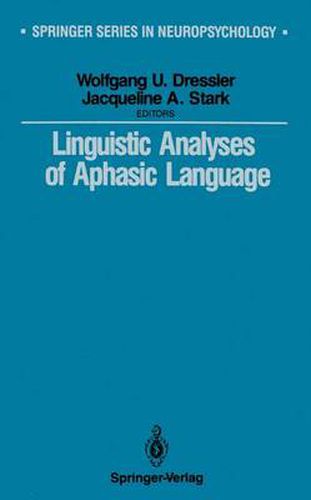Readings Newsletter
Become a Readings Member to make your shopping experience even easier.
Sign in or sign up for free!
You’re not far away from qualifying for FREE standard shipping within Australia
You’ve qualified for FREE standard shipping within Australia
The cart is loading…






This title is printed to order. This book may have been self-published. If so, we cannot guarantee the quality of the content. In the main most books will have gone through the editing process however some may not. We therefore suggest that you be aware of this before ordering this book. If in doubt check either the author or publisher’s details as we are unable to accept any returns unless they are faulty. Please contact us if you have any questions.
Linguistic Analyses of Aphasic Language represents results from linguistic and neurolinguistic research on aphasic language performance. The contributions encompass all linguistic levels, ranging from phonetics to discourse, and present results on languages other than English. The findings and applied methods are both relevant to the study of aphasia in general and to cross-linguistic analyses. Furthermore, they have clear implications for language and speech therapy and thus show the importance of linguistic concepts for language testing and therapeutic intervention.
$9.00 standard shipping within Australia
FREE standard shipping within Australia for orders over $100.00
Express & International shipping calculated at checkout
This title is printed to order. This book may have been self-published. If so, we cannot guarantee the quality of the content. In the main most books will have gone through the editing process however some may not. We therefore suggest that you be aware of this before ordering this book. If in doubt check either the author or publisher’s details as we are unable to accept any returns unless they are faulty. Please contact us if you have any questions.
Linguistic Analyses of Aphasic Language represents results from linguistic and neurolinguistic research on aphasic language performance. The contributions encompass all linguistic levels, ranging from phonetics to discourse, and present results on languages other than English. The findings and applied methods are both relevant to the study of aphasia in general and to cross-linguistic analyses. Furthermore, they have clear implications for language and speech therapy and thus show the importance of linguistic concepts for language testing and therapeutic intervention.